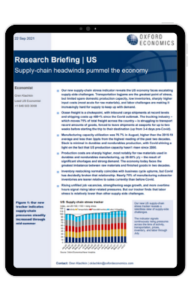Supply-chain headwinds pummel the US economy

Our new supply-chain stress indicator reveals the US economy faces escalating supply-side challenges. Transportation logjams are the greatest point of stress, but limited spare domestic production capacity, low inventories, sharply higher input costs (most acute for raw materials), and labor challenges are making it increasingly hard for supply to keep up with demand.
What you will learn:
- Ocean freight is a chokepoint, with inbound cargo shipments at record levels and shipping costs up 400+% since the Covid outbreak. The trucking industry – which moves 75% of total freight across the country – is struggling to transport record amounts of goods, forced to leave shipments at seaports for up to two weeks before starting the trip to their destination (up from 3-4 days pre-Covid).
- Manufacturing capacity utilization was 76.7% in August, higher than the 2015-19 average and less than 3ppts from the highest reading of the past two decades.
- Slack is minimal in durables and nondurables production, with Covid shining a light on the fact that US production capacity hasn’t risen since 2000.
- Production costs are sharply higher, most notably for raw materials used in durables and nondurables manufacturing, up 35-55% y/y – the result of significant shortages and strong demand. The economy today faces the greatest imbalance between raw materials and finished goods in two decades.
Tags:
Related Services

Post
US Rolls Up Welcome Mat for International Travel
Research Briefing Supply-chain headwinds pummel the US economy Trump tariffs set to raise effective rate above 1930s levels.
Find Out More
Post
Initial takeaways from Trump’s ‘Liberation Day’ announcement
In two or three years' time, US imports could fall by around 15% due to discounted reciprocal tariff hikes.
Find Out More